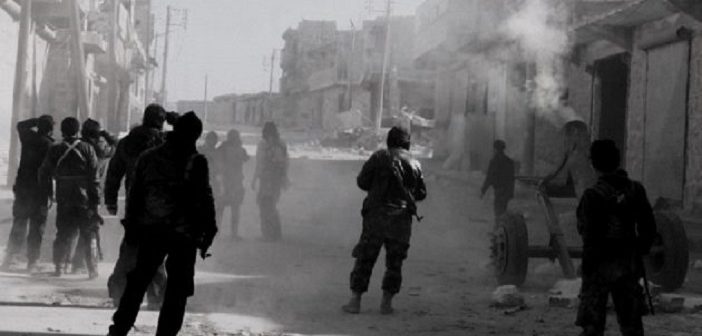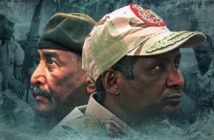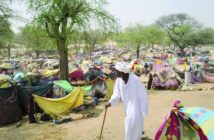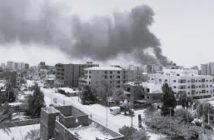Now that the Islamic State has lost almost all of its territory in Western-Syria, the Syrian regime’s attention has shifted towards the wider uprising.
In the north, the regime has sent militias to help the Kurdish YPG in Afrin, which has been under attack by the FSA. The various Islamist rebel groups who are conducting this offensive are on the payroll of the Turkish government and directed by Ankara. The US has given its green-light for the battle between its so-called Coalition partners. President Trump stated the US is focusing on the Islamic State: “We’re there (in Syria) for one reason: to get ISIS and get rid of ISIS and to go home.” Nevertheless, barely any progress has been made against the Islamic State, which is still bogged down in the Eastern desert. It’s far more likely that Washington is using the IS situation as an excuse to remain in Syria for the foreseeable future.
The regime militias in Afrin, were escorted by Russian military police to deter any Turkish airstrikes on the convoy. Even so, they’ve suffered causalities on the frontline and time will tell if the Syrian government decides to activate its air-defence system. For now, the most likely scenario is a deal between the actors on the ground, which will lead the regime taking control over Afrin. By taking the YPG out of the equation there would be no legitimate reason for Turkey to continue the Olive Branch Operation.
Just to the south of Afrin, the rebels are entrenched in Idlib province. In the month of January, Hayat Tahrir as-Sham (former al-Nusra Front) fought a bitter battle against the regime’s elite Tiger Forces which saw the government recapture of Abu Duhur airbase. The two other major groups, Ahrar as-Sham and Nour al-din-Zinki, joined the HTS defence only when the battle drew to its close, causing resentment by the al-Qaeda linked HTS. This resentment escalated to a full-blown intra-rebel battle between Ahrar al-Sham, Nour al-din-Zinki (who united into the Syrian Liberation Front) against the HTS in February. Thus far, the infighting has resulted in the takeover by Ahrar and Zinki of the second largest city in Idlib province, Mara’at an-Numan from the HTS.
As the frontline against the regime calmed-down, the Tiger Forces shifted their attention to the last major rebel-stronghold near Damascus, Eastern-Ghouta.
Long regime convoys headed to Ghouta from Idlib and even Deir-el-Zor to take part in the operation named “Damascus Steel”. As usual, the Tiger Forces and Republican Guard launched a massive artillery and air campaign which ever since the fall of Aleppo brought tremendous success. At the same time, Russia deployed four brand-new Su-57 5th generation fighter jets for the first time in Syria.
The day and night rocket campaign to soften the rebel lines also brought civilian causalities and outcry in the mainstream-media. This led to a UN Security Council vote on the 24th of February. Surprisingly, the resolution passed with no veto from Russia and China. The decision on paper should lead to a cease-fire and access to humanitarian aid. Unfortunately, it’s naive to believe that it will lead to long-term de-escalation on the ground, as the regime is heavily invested in securing Damascus.
Hours and days after the vote, Russian and Iranian officials stated that while they’re going to implement the decision, the fight against “terrorists” won’t stop. As such, the fight against elements allied to HTS in Ghouta won’t stop either. The groups present on the ground in Ghouta, in order of strength are: Jaysh al-Islam – Salafi inspired group, supported by Saudi-Arabia; and Faylaq al-Rahman – Islamist, supported by Qatar.
These two groups are rivals and control the majority of Eastern Ghouta, while HTS (former al-Qaeda associate, operates in Faylaq al-Rahman territory); and Ahrar as-Sham (Salafi group, controls the Harasta suburb in Eastern Ghouta and is supported by both Qatar and Turkey).
The Russian foreign minister, Sergey Lavrov, stated days after the UN Security Council vote that: “Gun men of Ahrar as-Sham and Jaysh al-Islam cooperate with al-Nusra Front and therefore not covered by ceasefire. We will not accept that resolution 2401 is a cover to protect the terrorists in Ghouta who bomb Damascus and we will not allow attempts to get them out of the legitimate strikes.”
This essentially means the continuation of the offensive and airstrikes. No decrease in violence has taken place since the passing of the resolution.
* * *
The United Nations ceasefire vote was just propaganda to make Russia and Syria seem more humane, while neither of them had any plans to stop their attacks long-term.
The designated terrorist group, HTS is a miniscule actor in Eastern-Ghouta, which has their base in Idlib province in the north. As long as Damascus is threatened by the rebels (who continue to launch mortars on Damascus targeting civilians), Bashar al-Assad will remain determined to clear-up the pocket or bus them to Idlib. The battle of Ghouta is one of the most intense so far in the war, involving rebels who’ve been entrenched there for years. It will take months to make progress.
Similar to the Aleppo debacle, Russia has opened humanitarian corridors. It’s likely that the fate of Ghouta will be similar.






1 Comment
The West wanted to save al Qaeda in East Ghouta, the Syrian government wants to destroy them. As should be. So there comes this UN Resolution saying in fact nothing. It contradicts itself in some ways. Anyway al Qaeda wants to fight until the near bitter end as always. They are idiots sacrificing their people for Israel and the West in general.